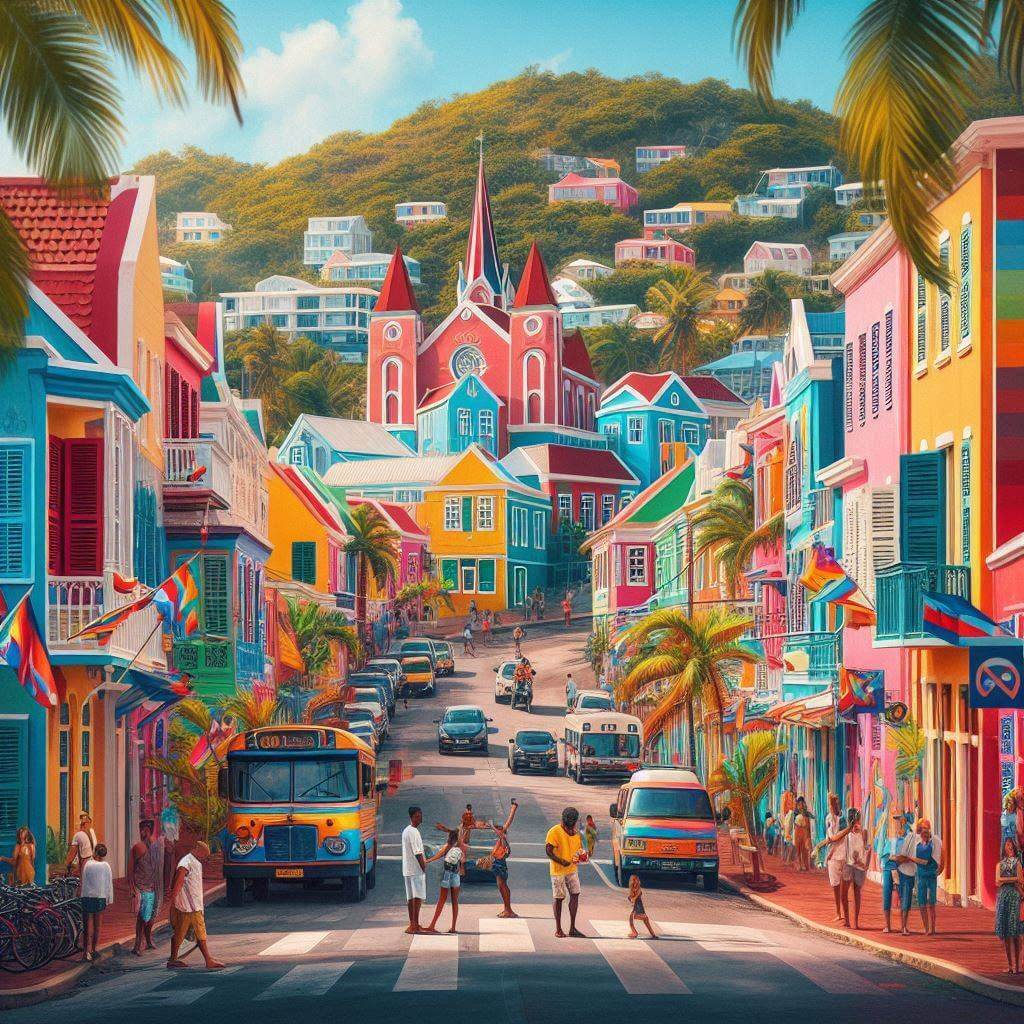The flag of Sint Maarten consists of two horizontal stripes of red and blue, with a white equilateral triangle on the hoist side containing the coat of arms. This distinctive design reflects the island's unique identity and aspirations within the Kingdom of the Netherlands.
Sint Maarten information
| National Flag Day | November 11 (Sint Maarten Day) |
| Sovereign state | Constituent country within the Kingdom of the Netherlands |
| Official name | Sint Maarten (Dutch part of the island) |
| Capital | Philipsburg |
| Population | 40,917 (2020 estimate) |
| Area | 41 km² |
| Currency | Antillean Guilder (ANG) |
| Language | Dutch, English |
| Continent | North America |
| Region | Caribbean |
| Subregion | Lesser Antilles |
| Borders | France (Saint-Martin) |
| Timezone | Atlantic Standard Time (AST) UTC-4 |
| Calling code | +1-721 |
| Top-level domain | .sx |
History of the Sint Maarten Flag
 The flag was officially adopted on June 13, 1985, marking a significant milestone in Sint Maarten's journey towards greater autonomy. Prior to this, the island used various unofficial flags, including the flag of the Netherlands Antilles. The current design was chosen to represent Sint Maarten's distinct culture and identity while acknowledging its ties to the Kingdom of the Netherlands.
The flag was officially adopted on June 13, 1985, marking a significant milestone in Sint Maarten's journey towards greater autonomy. Prior to this, the island used various unofficial flags, including the flag of the Netherlands Antilles. The current design was chosen to represent Sint Maarten's distinct culture and identity while acknowledging its ties to the Kingdom of the Netherlands.
Symbolism and Design of the Sint Maarten Flag
Each element of the Sint Maarten flag holds deep symbolic meaning:
- The red stripe represents courage and the unity of the Sint Maarten people.
- The blue stripe symbolizes the surrounding Caribbean Sea and the island's clear skies.
- The white triangle stands for peace and freedom.
- The coat of arms features a pelican, the national bird of Sint Maarten, symbolizing resilience and self-reliance.
- The courthouse in the coat of arms represents justice and democracy.
- The orange-yellow sage, the national flower, symbolizes the island's natural beauty.
- The motto "Semper Pro Grediens" (Always Progressing) reflects the nation's forward-looking spirit.
Usage and Significance of the Sint Maarten Flag
 The flag of Sint Maarten is a powerful symbol of national identity and pride. It is prominently displayed on government buildings, schools, and during national celebrations such as Sint Maarten Day on November 11. The flag also plays a crucial role in international events, representing the island's unique status as a constituent country within the Kingdom of the Netherlands.
The flag of Sint Maarten is a powerful symbol of national identity and pride. It is prominently displayed on government buildings, schools, and during national celebrations such as Sint Maarten Day on November 11. The flag also plays a crucial role in international events, representing the island's unique status as a constituent country within the Kingdom of the Netherlands.
Interesting Facts About the Sint Maarten Flag
- Sint Maarten shares the island of Saint Martin with the French collectivity of Saint-Martin, making it the smallest landmass in the world shared by two sovereign entities.
- The flag's design was the result of a public competition, reflecting the democratic values of Sint Maarten.
- The red and blue colors of the flag are also present in both the Dutch and French flags, subtly acknowledging the island's unique dual heritage.
- Despite being part of the Kingdom of the Netherlands, Sint Maarten maintains its own distinct flag rather than using the Dutch flag, emphasizing its autonomy in internal affairs.